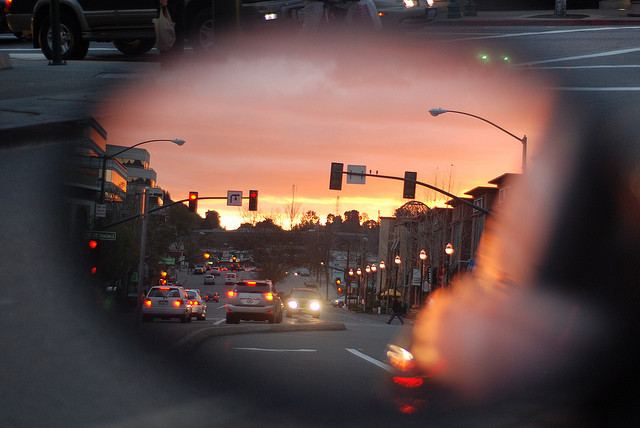Recently, my car’s rear view mirror popped off the windshield.
For the remainder of the drive, I left the poor, helpless mirror in the passenger seat and was extra careful and engaged as I checked behind me while driving.
At one point in my travels, I made a necessary lane change in heavy traffic.
After I merged into the next lane, I offered a friendly “thank you, buddy” wave to the car behind me. At this very moment, I was absolutely struck by the knowledge that I adhere to a belief I hadn’t even been aware of until I waved to this helpful driver.
I wait for the “no problem, buddy” wave response.
If the driver behind me waves back, I feel all is right in the world and we have had a human-to-human experience of acknowledgment. If the other driver does not wave back (this also applies to drivers who don’t extend the “thank you, buddy” wave), I feel that my fellow man has dismissed my existence on some level—and in turn feel like they are a little less awesome than the average bear.
The difference this time?
There was no rearview mirror allowing me to glance behind me to notice if the other driver extended the “no problem, buddy” wave.
You know what was different? I didn’t care.
I offered my gratitude in a wave and it was no longer important that I receive a reciprocating wave because I had no way of knowing. I didn’t require validation.
Maybe this is a small thing, but all of a sudden I was able to be an unsuspecting witness of myself.
This understanding of my need to be validated by a complete stranger expanded outward to become a larger concept.
What if I don’t know what anyone thinks about me? It’s none of my business anyway. It doesn’t affect my truth. If I don’t know, I certainly don’t care.
It’s the attention that I give to seeking approval that gives the approval itself, or lack thereof, its power.
As long as I do not put forth the desire and attention to care about what others think of me, it is no longer a concern of mine. I can continue to act exactly as I would act regardless of another person’s response, and I can shed the unnecessary energy put toward an expectation.
Apply this idea to any area where you’re concerned about someone’s response to you. Truly do what you feel is right and allow the response to simply be what it is.
This release of the necessity to grasp onto another’s response is a form of aparigraha. Aparigraha is one of the five yamas (guidelines of discipline and self-control within the eight-fold path) of Patanjali in the eight-limbed path of Raja yoga.
The basis of aparigraha is non-possessiveness, non-attachment.
Holding onto the perception that someone else has of you is a form of attachment that doesn’t serve you in becoming more enlightened. Using the metaphor of the rearview mirror becomes even more significant when viewed through the lens of aparigraha.
How is looking back at something going to help you move forward?
Though it’s necessary for safety (note to self: repair ASAP), you won’t stare down your rearview mirror solely and expect to get yourself to your next destination with mindfulness.
You’ll be distracted. You’ll miss things that are important. You’ll get caught up on an event that’s behind you rather than focusing on what is directly in front of you right now.
Keep your rearview mirror, lose the attachment to it.
Love elephant and want to go steady?
Sign up for our (curated) daily and weekly newsletters!
Apprentice Editor: Brandie Smith/Editor: Catherine Monkman
Photo: Gosheshe/Flickr
 Share on bsky
Share on bsky



Read 2 comments and reply